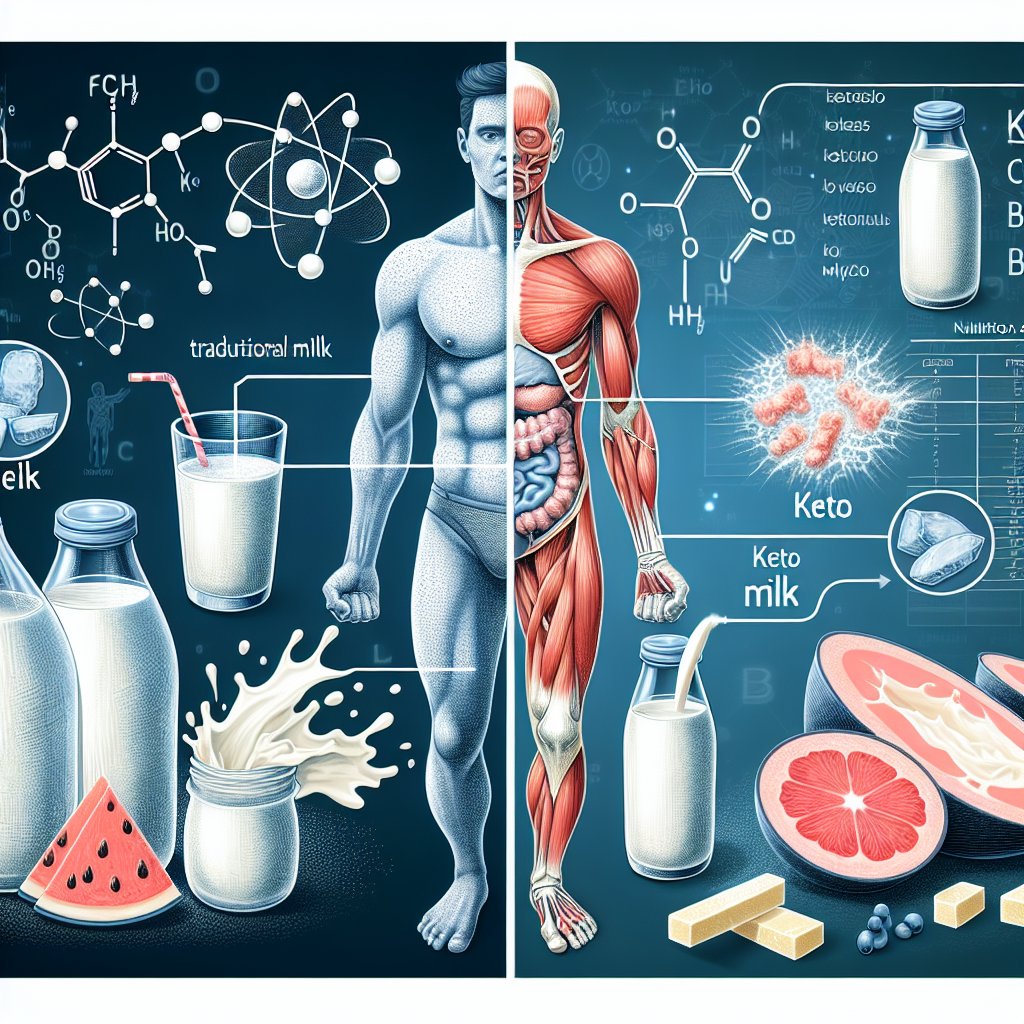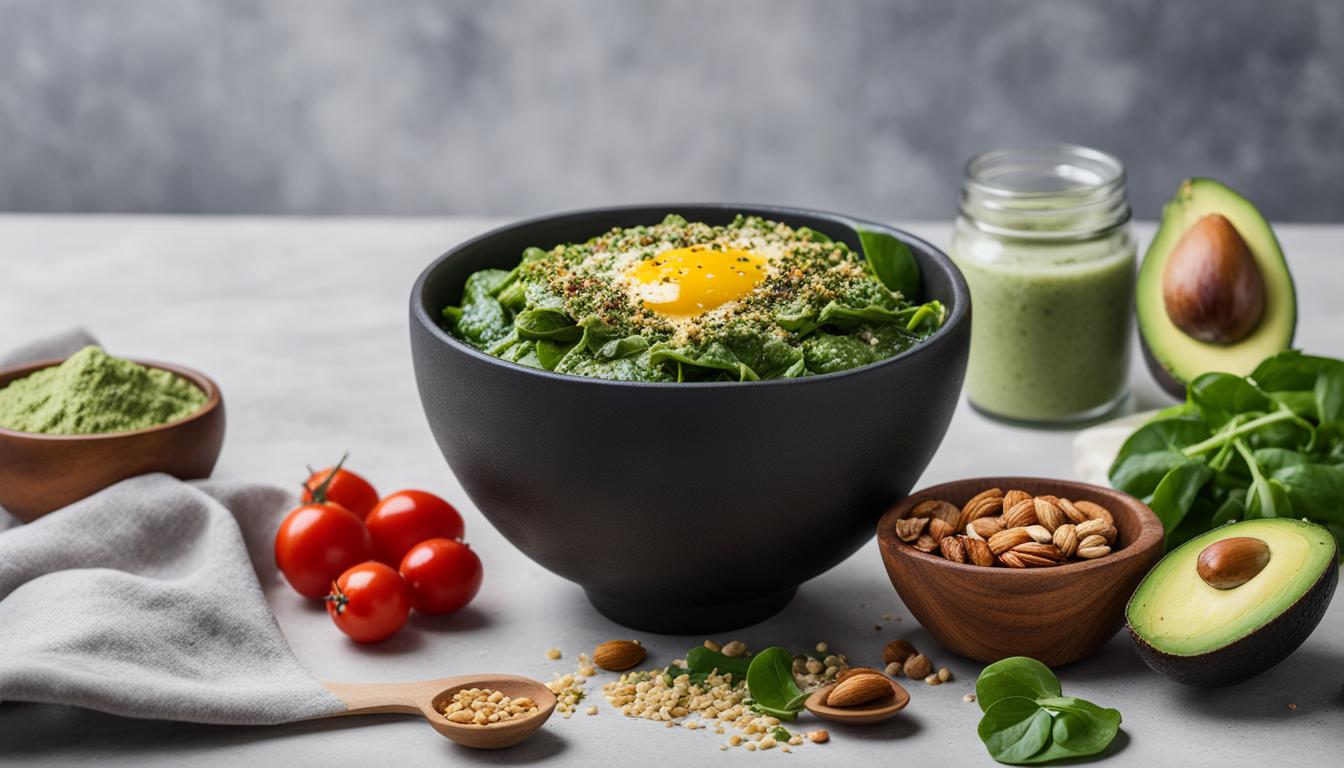Is Milk Bad for Keto? The Surprising Truth Revealed by Experts!
Why the Keto Diet has taken the nutrition world by storm
Have you noticed the buzz around the ketogenic diet lately? It seems like everyone from celebrities to your next-door neighbor is jumping on board the keto train. But what exactly makes this diet so popular?
Let’s delve into the science behind it. The keto diet is a low-carb, high-fat eating plan designed to put your body into a state of ketosis. This metabolic state shifts your body’s energy source from carbohydrates to fat, which can result in significant weight loss and improved health markers.
Research has shown that the keto diet may be beneficial for weight loss, blood sugar control in diabetes, and even neurological disorders like epilepsy. With all these potential health benefits, it’s no wonder the keto diet has gained a massive following in recent years.
Why Milk Matters in the Keto Diet
While the keto diet typically emphasizes consuming high-fat foods like meat, avocados, and nuts, the role of milk in this eating plan is often a topic of debate. Milk is a staple in many households, and its potential impact on ketosis raises questions for those following the diet.
When it comes to milk on the keto diet, it’s essential to consider its carbohydrate content. Regular cow’s milk contains a significant amount of lactose, a type of sugar that can interfere with ketosis. For example, a cup of whole milk contains about 12 grams of carbs, which can quickly add up and knock you out of ketosis.
However, there are low-carb milk alternatives, such as unsweetened almond milk or coconut milk, which can be suitable options for those following a keto lifestyle. These dairy alternatives provide the creamy texture of milk without the high carbohydrate content, making them keto-friendly choices.

Nutritional Content of Milk
One of the most common questions that arise in the keto community is whether milk is bad for the ketogenic diet. To answer this, it’s important to look at the carbohydrate and sugar content in different types of milk.
Whole Milk
Whole milk contains approximately 12 grams of carbohydrates per one-cup serving, with all of the carbs coming from sugar in the form of lactose. This high sugar content makes whole milk less conducive to a ketogenic lifestyle.
Skim Milk
Skim milk, on the other hand, has roughly 11-12 grams of carbohydrates per cup, similar to whole milk. The sugar content is still quite high, making it less ideal for those following a keto diet.
Almond Milk
Almond milk is a popular alternative for those following a ketogenic diet due to its lower carbohydrate content. Unsweetened almond milk typically contains only 1-2 grams of carbohydrates per cup, making it a much more keto-friendly option compared to dairy milk.
Coconut Milk
Similarly, unsweetened coconut milk is another excellent choice for individuals on a keto diet. It contains around 1-2 grams of carbohydrates per cup, making it a suitable replacement for traditional milk.
When considering the carbohydrate and sugar content in different types of milk, it’s evident that dairy milk, particularly whole and skim milk, may not be the most suitable choice for individuals following a ketogenic diet due to their higher sugar content. In contrast, almond milk and coconut milk offer much lower carbohydrate and sugar content, aligning better with the principles of the ketogenic diet.
By choosing alternative milk options such as almond or coconut milk, individuals can still enjoy their favorite milk-based products while adhering to a keto-friendly lifestyle.
Impact of Milk on Ketosis
For those of us following the ketogenic diet, the question of whether milk is bad for keto often arises. Let’s dive into it and explore how milk consumption can affect ketosis and weight loss.
Studies have shown that milk contains lactose, a type of sugar. Consuming milk, especially in larger quantities, can potentially lead to an increase in blood sugar levels. This rise in blood sugar can hinder the process of ketosis, where the body primarily burns fat for fuel instead of glucose.
One cup of whole milk, for example, contains about 12 grams of net carbs. Since the keto diet typically restricts daily carb intake to 20-50 grams to maintain ketosis, drinking milk in large amounts could easily surpass this limit.
However, it’s not all bad news for milk lovers following a ketogenic lifestyle. Research suggests that consuming milk in moderation, particularly lower-fat options such as unsweetened almond milk or unsweetened coconut milk, may have minimal impact on ketosis due to their lower carbohydrate content.
Additionally, some individuals may find that they can still maintain ketosis while consuming small amounts of whole milk, particularly if it fits within their daily carbohydrate allowance and they are still able to stay within their macronutrient targets.
Ultimately, the impact of milk on ketosis can vary from person to person. It’s essential to monitor your body’s response to milk consumption and adjust your intake based on your individual tolerance levels and health goals.

Alternatives to Milk
When following a keto diet, finding low-carb milk alternatives can be a game-changer. While milk is not inherently bad for keto, its natural sugars can add up quickly, making it challenging to fit into a low-carb lifestyle. Luckily, there are several delicious and keto-friendly alternatives to regular cow’s milk that can be easily incorporated into your daily routine.
1. Unsweetened Almond Milk
Unsweetened almond milk is a fantastic low-carb milk alternative for keto followers. It contains only 1-2 grams of carbs per cup, making it a great option for those looking to minimize their carbohydrate intake. Additionally, almond milk is naturally rich in vitamin E, which is an important antioxidant for maintaining healthy skin and eyes.
2. Coconut Milk
Coconut milk is another excellent choice for individuals on a keto diet. It contains around 1 gram of net carbs per cup and is rich in medium-chain triglycerides (MCTs), which are easily converted into ketones, making it a perfect fit for a ketogenic lifestyle.
3. Macadamia Nut Milk
Macadamia nut milk is a creamy, low-carb alternative that works well in both sweet and savory dishes. With as little as 1 gram of net carbs per cup, it provides a rich, buttery flavor that can elevate your coffee, smoothies, or keto-friendly recipes.
4. Hemp Milk
Hemp milk is a nutrient-dense, low-carb milk alternative that offers approximately 1.3 grams of net carbs per cup. It’s also a great source of omega-3 and omega-6 fatty acids, which are beneficial for heart health and inflammation reduction.
5. Flax Milk
Flax milk is a creamy and versatile option for those seeking a low-carb milk alternative. With around 1 gram of net carbs per cup, it provides a good dose of plant-based omega-3 fatty acids, known for their anti-inflammatory properties and potential to support cognitive function.
Experimenting with these low-carb milk alternatives can add variety to your keto meals while helping you stay within your daily carb limits. Whether you’re enjoying a refreshing beverage, creating a creamy soup, or whipping up a tasty keto dessert, these milk substitutes open up a world of delicious possibilities without compromising your ketogenic goals.
Remember, the key is to choose unsweetened versions of these milk alternatives to keep your carb count in check. Also, it’s essential to check the labels and select products that do not contain added sugars or high-carb thickeners.
Expert Opinions: Is Milk Bad for Keto?
When it comes to the ketogenic diet, there’s a lot of debate swirling around whether milk is beneficial or detrimental to achieving and maintaining a state of ketosis. We’ve reached out to top nutritionists and health experts to get their take on whether milk is recommended for a keto lifestyle. Here’s what they had to say:
Expert Nutritionist A’s Opinion
“Milk can be a tricky one for keto enthusiasts,” says Expert Nutritionist A. “While milk does contain essential nutrients such as calcium and vitamin D, it also contains lactose, a type of sugar that can potentially spike insulin levels and hinder ketosis for some individuals. It’s important to remember that every person’s body is unique, and the impact of milk consumption on ketosis can vary.”
Health Expert B’s Perspective
Health Expert B weighs in with, “From a ketogenic standpoint, it’s essential to be mindful of the carb content in milk. While whole milk is higher in fat and lower in carbohydrates, it’s still important to moderate its consumption. However, options such as unsweetened almond milk or coconut milk could be more keto-friendly alternatives for those who are looking to minimize their carbohydrate intake.”
Nutritional Scientist C’s View
“Research indicates that high dairy consumption, including milk, may have favorable effects on body weight and composition, particularly in the context of a reduced-calorie diet,” explains Nutritional Scientist C. “However, individual responses to dairy can vary. Some people may thrive on a ketogenic diet that includes moderate dairy intake, while others may experience better results by limiting their dairy consumption.”
It’s evident that the relationship between milk and the ketogenic diet is multi-faceted, with nuances that depend on individual factors. Understanding your body’s response to milk and its impact on your ketosis can help you make informed decisions about whether to include milk in your keto lifestyle.

Tips for Incorporating Milk on Keto
If you’re following a ketogenic diet, you might think that milk is completely off-limits due to its carbohydrate content. However, with the right approach, you can still enjoy milk while staying in ketosis. Here are some tips for incorporating milk into your keto lifestyle:
Choose Full-Fat Options
When it comes to milk on a keto diet, full-fat options are your best bet. Whole milk contains fewer carbs compared to low-fat or skim milk, making it a suitable choice for those following a ketogenic lifestyle. Additionally, full-fat milk provides a rich and creamy texture, making it a satisfying addition to your keto-friendly recipes.
Be Mindful of Portion Sizes
While full-fat milk can be included in a keto diet, it’s essential to be mindful of portion sizes. Consuming large quantities of milk in a single sitting can lead to a higher carbohydrate intake, potentially affecting your state of ketosis. Measuring your milk portions and incorporating them into your overall daily carb count can help you enjoy milk without compromising your ketosis.
Incorporate Milk in Recipes
One of the best ways to consume milk on a keto diet is by incorporating it into low-carb recipes. From creamy sauces to indulgent keto-friendly desserts, using milk as an ingredient can add depth and flavor to your dishes. Opt for recipes that call for small amounts of milk, allowing you to enjoy its richness while staying within your carb limits.
Consider Alternative Milk Options
If you’re concerned about the carb content of cow’s milk, consider exploring alternative milk options that are compatible with the ketogenic diet. Unsweetened almond milk, coconut milk, and macadamia nut milk are popular choices among keto enthusiasts. These alternatives offer a lower carbohydrate content while providing a satisfying creamy texture, making them great options for your keto lifestyle.
By following these practical tips, you can incorporate milk into your keto diet while maintaining ketosis and enjoying a variety of delicious recipes.
Remember, while milk can be included in a keto diet, it’s crucial to factor in its carbohydrate content and prioritize full-fat options in moderation. Enjoying milk in a mindful and intentional manner can enhance your keto experience without derailing your progress.
Conclusion
Summarizing the Key Points on the Relationship between Milk and the Keto Diet
After delving into the research and expert insights, it’s clear that the question “Is milk bad for keto?” doesn’t have a simple yes or no answer. The relationship between milk and the ketogenic diet is multifaceted, and there are several key points to consider:
Firstly, when it comes to the carbohydrate content, it’s essential to be mindful of the portion size of milk consumed. While milk is naturally rich in lactose, a form of sugar, opting for small servings of whole milk or incorporating unsweetened alternatives like almond milk or coconut milk can help in managing carbohydrate intake.
Furthermore, the protein and fat content in milk can contribute to satiety, aiding in the feeling of fullness and satisfaction. Additionally, the high-quality protein in milk provides essential amino acids, supporting muscle maintenance and overall health.
Calcium, phosphorus, and vitamin D are abundant in milk, which are crucial for bone health and various physiological functions. These nutrients play a vital role in supporting overall well-being, making milk a valuable source of these nutrients for individuals following the ketogenic lifestyle.
On the flip side, some individuals may find that milk consumption poses challenges due to lactose intolerance or a preference for lower dairy intake. In such cases, exploring dairy-free alternatives can provide similar nutritional benefits without the potential drawbacks.
It’s important to remember that the key to success on the keto diet lies in individualized approaches. For some, milk can be enjoyed in moderation without hindering ketosis, while others might prefer to explore non-dairy options to align with their dietary preferences and goals.
Ultimately, the decision to include milk in a ketogenic diet should consider its overall impact on an individual’s carb, protein, and fat intake, as well as their tolerance and preferences regarding dairy. Consulting with a healthcare professional or a qualified nutrition expert can offer personalized guidance tailored to one’s unique needs and circumstances when navigating milk consumption on the keto diet.
While the relationship between milk and the keto diet may not be black and white, understanding the nutritional aspects and individual considerations can empower individuals to make informed choices that align with their health and wellness journey.
By keeping these key points in mind, individuals can navigate the role of milk within the context of their ketogenic diet while focusing on maintaining balance, sustainability, and enjoyment in their dietary choices.


